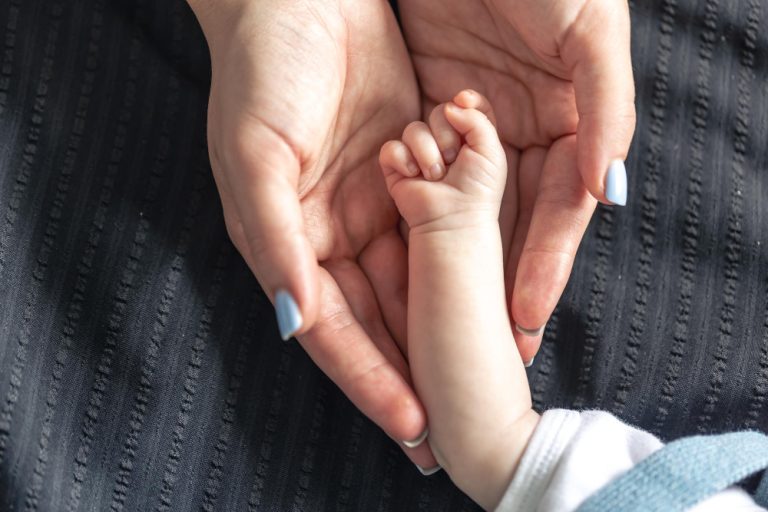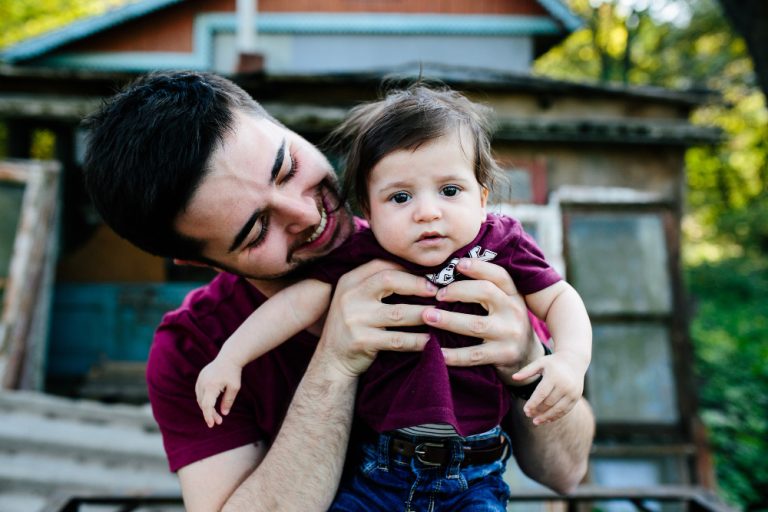When Do Babies Start To Recognize Their Parents?
Have you ever wondered when do babies start to recognize their parents, amidst a world of new faces and experiences? The magic of when babies recognize their parents is a pivotal moment that carries profound emotional significance for both the child and caregiver. Understanding this crucial development milestone is not only intriguing but holds the key to deepening the bond between parent and baby.
In this blog, we delve into the captivating journey of when do babies start to recognize their parents, exploring the intricacies of visual and auditory cues that play a pivotal role in this process.
From the earliest moments of glimpsing a familiar face to the heartwarming embrace of a mother’s voice, each interaction shapes a baby’s growing understanding of the world around them.
Join us as we unravel the mysteries of newborn cognition, shedding light on the fascinating progression of recognition skills in babies and unveiling practical tips for nurturing this special connection.
Discover the science behind the magic as we venture on a journey through the enchanting realm of early parent-child relationships.
When Do Babies Start To Recognize Their Parents?
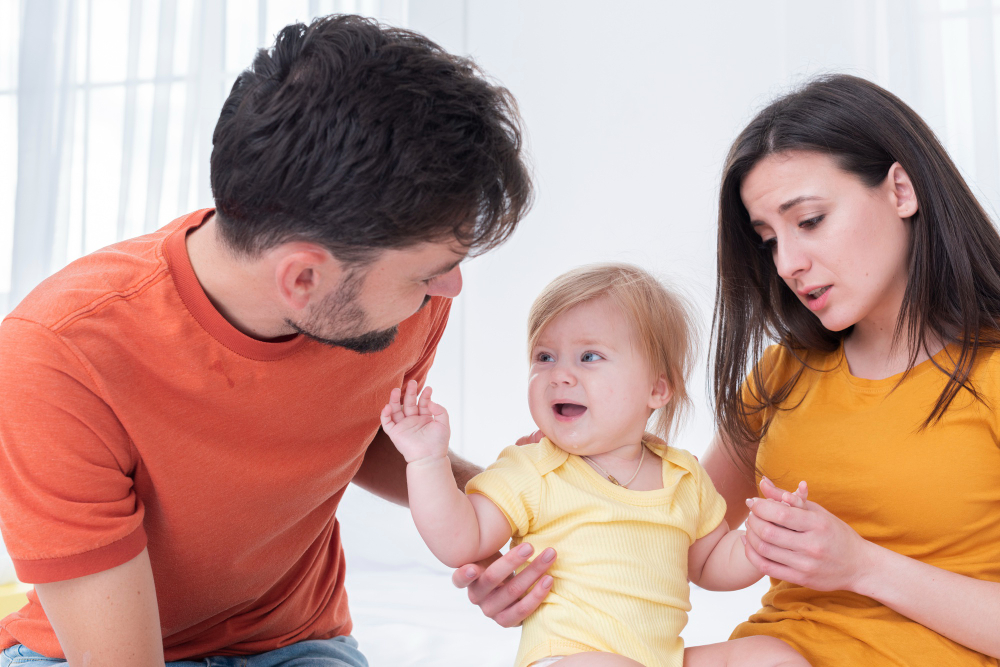
Babies recognizing their parents is an awe-inspiring developmental milestone that highlights the deep emotional connection between a child and their caregivers. As a parent, it’s natural to wonder when this recognition will occur and what factors influence it. Understanding the timeline and significance of this milestone can help strengthen the bond between you and your baby.
Recognition is a complex process influenced by various factors. Newborn babies rely on their sense of smell to identify familiar scents, like the comforting scent of their parents. They also show preference for their parents’ voices, finding solace and security in the soothing tones they have come to recognize since their time in the womb.
As babies grow, their visual recognition skills develop. Around 2 to 4 months, they start responding to familiar faces, often displaying contagious social smiles in response to their parents’ loving gazes. This visual recognition becomes more nuanced as they reach 6 months, with babies becoming better at deciphering facial expressions and differentiating between familiar and unfamiliar individuals.
By 9 months, their developing object permanence allows them to recognize their parents even when they are not physically present. And as toddlers, between 15 to 18 months, they begin recognizing their parents through a combination of facial features, voice, and interactive cues.
Your baby’s recognition of you and your partner plays a crucial role in their emotional well-being and sense of security. Understanding the developmental timeline and being aware of the environmental factors that support recognition can help you nurture this unique bond.
In the following sections, we will delve deeper into the factors influencing recognition, the developmental milestones associated with it, and practical activities to strengthen parent recognition.
Remember, each baby is unique, and these milestones serve as general guidelines. Let’s explore this remarkable journey of recognition together.
Factors Influencing Baby’s Recognition

Recognizing their parents is an essential milestone in a baby’s development, and several factors play a crucial role in their ability to do so. Understanding these factors can help parents support their baby’s recognition process effectively. Here are the key elements that influence a baby’s ability to recognize their parents:
1. Smell
A baby’s sense of smell plays a significant role in recognizing their parents. Newborns have a keen sense of smell and can differentiate their mother’s scent from others. Research suggests that a baby’s sense of smell develops in the womb, making them familiar with their mother’s scent even at birth.
2. Voice
A baby’s recognition of their parents is strongly influenced by their voices. Infants can recognize their parents’ voices within the first few months of life. Parents often notice their babies respond differently to their voice compared to others, making vocal cues a crucial factor in recognition.
3. Visual Cues
Babies rely heavily on visual cues to recognize their parents. Initially, they have a preference for faces over other objects. By the age of two months, babies start developing visual recognition skills and can distinguish familiar faces, including their parents’.
These factors work together to shape a baby’s ability to recognize their parents. As parents, nurturing the bond through frequent physical contact, talking to the baby, and maintaining a consistent presence helps strengthen the recognition process. Providing a loving and secure environment enables babies to develop a deep sense of familiarity and trust with their parents.
Remember, every baby develops at their own pace, so it’s important to be patient and supportive throughout the recognition journey.
Developmental Timeline
Understanding the developmental timeline of babies recognizing their parents is an exciting journey. Let’s explore the key milestones that mark this important stage of emotional connection and bonding.
Birth
At birth, newborn babies already demonstrate a preference for familiar voices and smells. Research suggests that they can recognize the sound of their mother’s heartbeat and distinguish it from other sounds they hear in the environment. This early recognition of their primary caregiver sets the foundation for the parent-child relationship.
2 to 4 Months
Between 2 to 4 months of age, babies’ visual recognition skills start to develop. They become more responsive to faces and initiate social smiles. As they observe their parents’ facial expressions and interact with them, the recognition of familiar faces strengthens. This stage marks an important turning point in their ability to identify parents.
6 Months
By 6 months, babies’ recognition of familiar faces continues to improve. They can differentiate between their parents and others, responding more strongly to the sight of their parents’ faces. Facial expressions play a crucial role in this phase as babies begin to interpret emotions displayed by their parents.
9 Months
Around 9 months, babies develop object permanence, the understanding that objects or people continue to exist even when they are out of sight. This cognitive leap allows infants to recognize and anticipate their parents’ presence, even when they are momentarily absent. This newfound sense of permanency enhances their recognition abilities.
15 to 18 Months
As toddlers approach the 15 to 18-month mark, their recognition of parents becomes more refined. They can identify their parents by facial features, voice, and interactions. This stage is also characterized by the growing ability to recognize other family members, further expanding their social connections.
The developmental timeline of babies recognizing their parents highlights the gradual progression in recognition skills. From early preferences for familiar voices and smells to discerning facial features and interpreting emotions, babies establish a deep sense of connection with their parents.
Nurturing this recognition through interactions, bonding experiences, and a consistent home environment strengthens the parent-child relationship and contributes to a baby’s emotional well-being.
“The smile of recognition from your little one is an affirmation of the special bond you’ve formed.” Dr. Gail Gross
Birth: When Do Babies Start To Recognize Their Parents?

During the first few weeks of life, newborn babies possess remarkable recognition abilities that contribute to their attachment and bonding with caregivers, especially their parents. Despite their limited vision, newborns demonstrate a preference for familiar voices and smells from the moment they enter the world.
Preference for Familiar Voices
Newborns have a strong inclination towards recognizing their parents’ voices. Research suggests that they can differentiate between their mother’s voice and other voices even shortly after birth. The sound of the mother’s voice provides a sense of security and comfort to the baby, acting as an early bonding mechanism.
Importance of Smell
Infants have a keen sense of smell and are able to recognize scents associated with their parents. They can pick up on the unique odor of their primary caregivers, particularly that of their mother. The sense of smell helps create a sense of familiarity and connection between the baby and their parents.
Preferential Responses
In addition to recognizing familiar voices and smells, newborns exhibit preferential responses towards their parents’ faces. They are naturally drawn to the mother’s face, as well as the distinct facial features of their primary caregivers. This early preference for familiar faces sets the foundation for later visual recognition skills to develop.
Understanding these initial recognition abilities of newborn babies can help parents nurture a stronger bond with their baby from the very beginning. By nurturing the sensory experiences of voice, smell, and face, parents can create a supportive environment that facilitates the baby’s emotional development and strengthens the parent-child connection.
2 to 4 Months: When Do Babies Start To Recognize Their Parents?
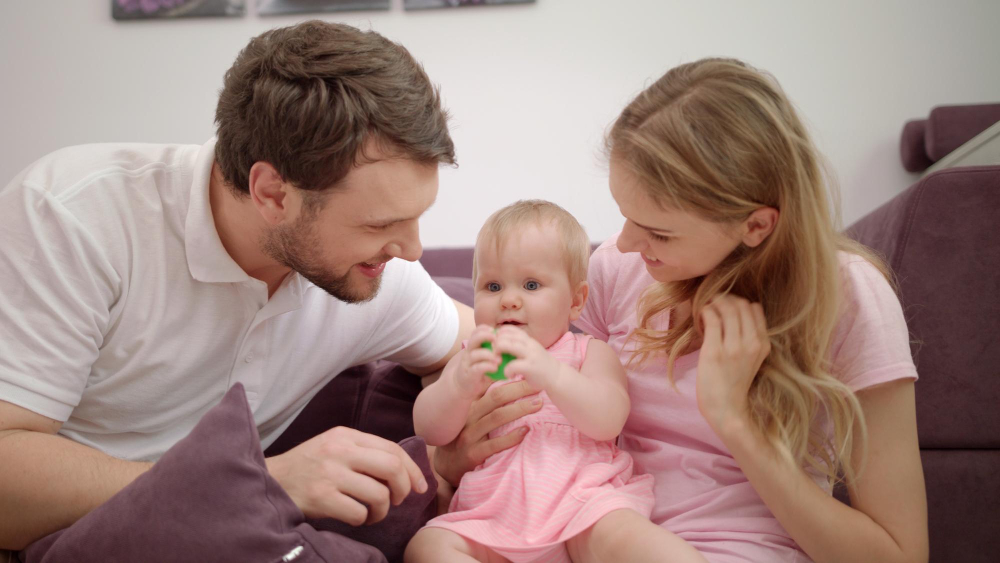
During the second to fourth month of a baby’s life, exciting developments take place as they start to recognize their parents in a more visual and interactive way. Visual recognition skills begin to emerge, allowing babies to respond to familiar faces and engage in social smiles.
At around 2 months old, babies become more visually attuned and show preferences for certain visual stimuli. They can distinguish between different faces, including their parents’.
Their ability to focus and track objects improves, enabling them to follow their parents’ movements with their eyes. The recognition process is supported by the baby’s memory development, as they start to form associations between their caregivers’ faces and positive experiences.
Another significant milestone during this period is the emergence of social smiles. Babies begin to engage in reciprocal smiling, responding to their parents’ smiles with their own joyful expressions. This mutual exchange of smiles creates a sense of connection and strengthens the bond between parent and child.
To aid in the development of visual recognition skills and encourage social smiles, parents can actively participate in face-to-face interactions with their baby. Making eye contact, smiling, and talking to the baby are simple yet effective ways to stimulate their visual and social development.
Incorporating colorful, visually engaging toys and objects during playtime can also help capture the baby’s attention and enhance their visual recognition abilities.
As the baby grows and becomes more adept at recognizing their parents, it is important for caregivers to continue providing a supportive and nurturing environment. Consistent care, loving interactions, and a trusted presence all contribute to the baby’s ongoing development of recognition skills and reinforce the bond between parent and child.
Remember, every baby develops at their own pace, so don’t be discouraged if your little one takes a bit longer to fully recognize you. The journey of recognition is a gradual process, and with time and loving care, your baby will continue to strengthen their visual recognition skills and deepen their connection with you.
During the second to fourth month, babies begin to develop visual recognition skills and engage in social smiles. They can distinguish familiar faces, including their parents’, and track their movements with their eyes.
Social interactions, such as making eye contact, smiling, and talking to the baby, are important for stimulating the baby’s visual and social development. Consistent care and loving interactions contribute to the ongoing growth of recognition skills and strengthen the bond between parent and child.
6 Months: When Do Babies Start To Recognize Their Parents?
At around six months of age, babies begin to show an increased ability to recognize familiar faces, including their parents. This stage marks an exciting milestone in their development, as they become more attuned to their immediate environment and the people who play a significant role in their lives.
During this period, babies start to exhibit a growing awareness of facial features and expressions. They may light up with joy when they see their parents’ faces or respond with excitement and familiarity. The ability to recognize familiar faces is crucial for building strong emotional connections and establishing a sense of security for infants.
Facial expressions play a vital role in this process of recognition. Babies become adept at deciphering various facial cues, such as smiles, frowns, and raised eyebrows. They can differentiate between happy and sad expressions, which further strengthens their bond with their parents.
Parents can support their baby’s recognition skills by engaging in face-to-face interactions and making exaggerated facial expressions. Smiling, making eye contact, and using animated voices can enhance the baby’s understanding of facial cues and help establish better recognition patterns.
It’s important to remember that each baby develops at their own pace, so some infants may show more advanced recognition abilities than others at six months. However, consistent interaction, nurturing, and love from parents go a long way in promoting and strengthening the recognition skills of babies at this stage.
By continuously engaging with their baby, parents can help create a sense of comfort and familiarity, supporting the important process of recognizing familiar faces, including their own.
9 Months: When Do Babies Start To Recognize Their Parents?
At around 9 months old, babies reach an important milestone in their recognition of parents the development of object permanence. This cognitive leap allows babies to understand that objects and people continue to exist even when they are out of sight, laying the foundation for recognizing parents even when they are not physically present.
Object permanence is the ability to remember and mentally represent objects or people. It enables babies to maintain the image of their parents in their minds, allowing for recognition and anticipation of their return. This newfound understanding brings a sense of security and emotional comfort to babies during periods of separation.
Babies at this stage demonstrate their recognition of parents through various behaviors. They may become excited or responsive when they see a parent approaching, showing an understanding of who they are. They may also display signs of distress or anxiety when separated from their primary caregiver, indicating a recognition of their absence.
To support the development of object permanence and strengthen recognition of parents, parents can engage in interactive games such as peek-a-boo, hide-and-seek, or playing with toys that disappear and reappear. These activities help reinforce the concept of objects and people existing even when temporarily out of sight.
It’s important to note that each baby develops at their own pace, and some may reach this milestone earlier or later than others. As parents, providing consistent and loving care, being a reliable presence, and responding positively to their emotional cues all contribute to the strengthening of the parent-child bond and the development of recognition skills.
As your baby grows and continues to reach new milestones, their recognition of parents will deepen, further solidifying the special bond between child and caregiver.
15 to 18 Months: When Do Babies Start To Recognize Their Parents?

During the toddler stage, which typically occurs between 15 to 18 months of age, babies continue to refine their recognition skills and become more adept at recognizing their parents. At this stage, they rely on facial features, voice, and interactions to identify their parents and establish a strong bond with them.
Facial Features
Toddlers show a heightened awareness of facial features and begin to recognize and differentiate their parents’ faces from others. They are more likely to respond with excitement and familiarity when they see their parents’ faces, indicating their growing ability to identify and connect with them visually.
Voice Recognition
Recognizing their parents’ voices becomes more apparent during this stage. Toddlers can distinguish their parents’ voices among others and respond in a way that reflects their familiarity and attachment. They may show enthusiasm, recognition, or even a sense of relief when hearing their parents’ voices.
Interactions and Attachments
The interactions between parents and toddlers play a vital role in reinforcing recognition and strengthening their bond. Toddlers actively seek engagement and validation from their parents through play, gestures, smiles, and shared experiences. Through these interactions, they further solidify their recognition of their parents.
To support recognition during this stage, parents can engage in activities that encourage face-to-face interactions, such as playing peek-a-boo or imitating each other’s expressions. These activities not only help toddlers recognize their parents but also promote social and emotional development.
As your toddler progresses through the 15 to 18-month milestone, cherish these moments of recognition and continue to cultivate a loving and nurturing environment. By nurturing this recognition, you are laying the foundation for a strong and secure attachment between you and your child.
Remember, each child develops at their own pace, so some toddlers may show these recognition skills earlier or later than others. Trust your instincts as a parent and enjoy the unique journey of watching your child grow and recognize their loved ones along the way.
Environmental Factors
The home environment and the bonding experiences that occur within it play a crucial role in a baby’s ability to recognize their parents. Consistent care and a nurturing atmosphere lay the foundation for the development of strong parent-child relationships. Here are some important environmental factors that influence a baby’s recognition of their parents:
1. Familiarity and Routine
Babies thrive on familiarity and routine. When they are exposed to consistent patterns of behavior and a predictable environment, they begin to associate certain cues with their parents. This can include the scent of their parents, the touch of their skin, and the sound of their voices.
2. Physical Proximity
Spending quality time in close proximity to the baby is essential for recognition. The more a baby is held, cuddled, and interacted with, the stronger the bond between the baby and their parents becomes. Physical closeness allows babies to become familiar with their parents’ facial features, expressions, and body language.
3. Emotional Availability
Parents who are emotionally available to their babies create a secure and nurturing environment. When babies receive consistent love, attention, and responsiveness from their caregivers, they develop a sense of trust and attachment. This emotional connection forms the basis for recognition and the ability to distinguish familiar faces.
4. Social Interactions
Engaging in positive social interactions with the baby promotes recognition. Smiling, talking, singing, and making eye contact are all crucial for babies to develop the ability to recognize their parents. These interactions provide opportunities for babies to learn and associate their parents’ voices, expressions, and gestures.
5. Consistency and Stability
Consistency in caregiving practices is essential for recognition. Babies rely on predictability and stability to establish a sense of security. When routines are consistent and stable, babies can easily identify and recognize their primary caregivers.
Remember, creating an environment that enhances recognition involves providing consistent care, emotional availability, and positive social interactions. By prioritizing these environmental factors, parents can actively support their baby’s ability to recognize and connect with them.
Activities to Strengthen Parent Recognition
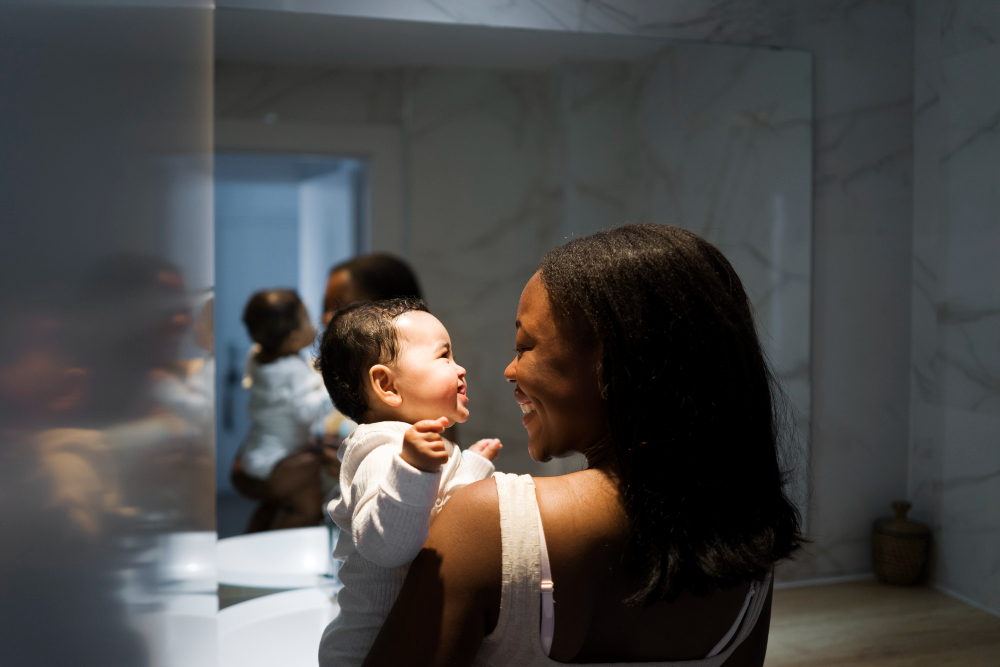
As a parent, you play a crucial role in helping your baby recognize you and build a strong bond. Here are some practical activities that can support your baby’s recognition of you as their parent:
1. Voice Interactions
- Talk to your baby frequently in a soothing and engaging voice. Hearing your voice helps your baby establish familiarity and aids in recognition.
- Sing songs, read books, and engage in verbal exchanges to stimulate their auditory development and strengthen the bond.
2. Name Repetition
- Use your baby’s name frequently during daily interactions. Repetition helps them associate the sound of their name with your presence, enhancing recognition.
- Include their name in songs, rhymes, and playful conversations to create positive associations and reinforce your identity as their parent.
3. Face-to-Face Time
- Spend quality face-to-face time with your baby. Maintain eye contact, smile, and make expressive facial gestures to captivate their attention and promotes recognition.
- Engage in activities that encourage visual tracking, such as playing with brightly colored toys or making different facial expressions.
4. Mirror Play
- Use a baby-safe mirror during playtime. Show your baby their reflection and point out facial features, gently saying, “That’s your nose, those are your eyes.”
- Mirror play not only aids in recognition but also promotes self-awareness and strengthens the parent-child bond.
5. Familiar Objects
- Introduce objects that hold particular significance to your family, such as a favorite blanket or a special toy. These familiar objects can act as cues for recognition.
- Encourage your baby to interact with these objects during playtime, emphasizing their connection to you and reinforcing familiarity.
Remember, every baby develops at their own pace, so be patient and consistent with these activities. By incorporating these strategies into your daily routine, you can actively support your baby’s recognition of you as their parent and nurture a strong bond between you both.
FAQs: When Do Babies Start To Recognize Their Parents?
Remember, every baby is unique and may reach recognition milestones at different times. Building a strong bond through love, attention, and consistent care will support your baby’s recognition and emotional well-being.



